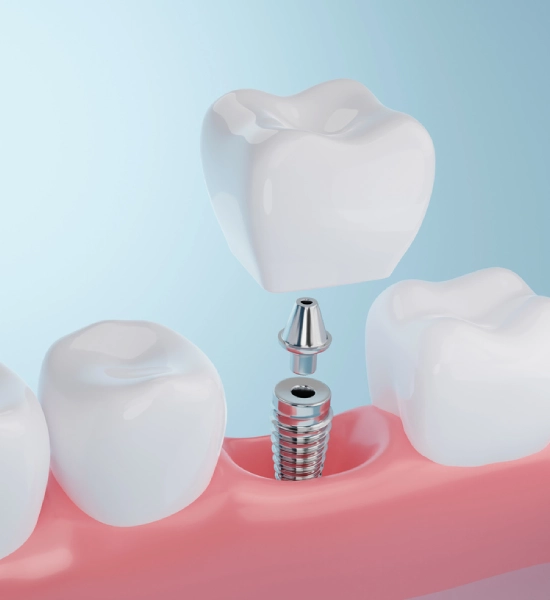Have you ever wondered, “Can your body reject a dental implant?” It’s a common concern for those considering this procedure. Dental implants have become incredibly popular for replacing missing teeth, offering a long-lasting, natural-looking solution. However, the fear of implant rejection lingers for many.
In this blog, we’ll closely examine the question: Can your body reject a dental implant? Understanding these aspects is important for anyone considering this treatment to restore their smile and oral health.
What are Dental Implants?
Dental implants are artificial tooth roots made from materials like titanium. They’re surgically implanted into the jawbone to support replacement teeth or dental prosthetics. Essentially, they act as sturdy anchors for dental crowns, bridges, or dentures, offering a natural-looking and functional solution for missing teeth. Through a process called osseointegration, implants fuse with the surrounding bone, ensuring stability and durability.
This modern dental procedure has become increasingly popular for restoring oral function, enhancing appearance, and improving the quality of life for people with missing teeth.

What does the Dental Implant Procedure entail?
The dental implant procedure typically involves several stages:
Consultation and Evaluation:
Your dentist will initially evaluate your dental health and the density of your jawbone to see if you’re eligible for dental implants.
Implant Placement:
During surgery, the dental implant is placed into the jawbone. This process needs precision and expertise to ensure proper positioning and integration.
Osseointegration:
Over the next few months, the implant fuses with the jawbone, creating a stable anchor for the artificial tooth.
Placement of the Crown:
Once osseointegration is complete, a custom-made crown is attached to the implant, restoring the appearance and function of the missing tooth.
Can the Body reject Dental Implants?
Though it’s uncommon for the body to outright “reject” a dental implant like it might with an organ, there are factors that can contribute to implant failure or complications. These include:
Poor Osseointegration:
If the implant fails to integrate with the jawbone, it may become loose or unstable over time.
Infection:
Bacterial infection around the implant site can compromise its stability and lead to implant failure.
Peri-implantitis:
This is a condition characterized by inflammation and infection of the tissues surrounding the implant. If left untreated, peri-implantitis can result in bone loss and implant failure.
Implant Overload:
Excessive pressure or force placed on the implant, such as from teeth grinding or clenching, can lead to implant failure.
What Are the Various Signs of a Dental Implant Failure?
To determine if your dental implant has failed, keep an eye out for the following signs:
Loose Implants:
Ideally, dental implants should feel just like your natural teeth. If your implants feel loose, move around, or seem out of place in your mouth, it’s crucial to contact your dentist immediately.
Pain:
While some discomfort is normal during the healing process after implant placement, excessive or sharp pain is cause for concern. If you experience persistent, severe pain that radiates throughout your mouth or jaw, it could indicate a problem with the implant.
Gum Swelling:
It’s common to experience gum swelling after dental implant surgery. However, if the swelling persists or worsens, accompanied by redness, it may signal an infection. Untreated infections can cause serious complications, so it’s essential to contact your dentist if you have prolonged swelling.
Difficulty Chewing:
Since dental implants are meant to function like natural teeth, experiencing pain or discomfort while chewing indicates a potential issue with the implant. If you find it challenging to chew or eat certain foods without discomfort, it’s advisable to consult your dentist to assess the implant’s condition.
What are the Causes of Teeth Implant Failure?
While dental implant failures aren’t common, occurring in about six to ten percent of cases, they can happen due to various reasons. Here are some factors that can contribute to implant failure:
Early Rejection:
Some people may have difficulty tolerating foreign objects like dental implants or steel rods in their bodies. Allergies to metals like titanium can also cause the body to reject the implant before it fully integrates with the jawbone, leading to symptoms like discomfort and poor healing.
Late Rejection:
Similar to early rejection, late rejection can occur due to issues like poor dental hygiene or trauma after the surgery. Signs of late rejection include discomfort and instability of the implants.
Aging Implants:
Dental implants placed many years ago may start to deteriorate over time. Older implants may not withstand wear and tear as effectively as newer ones due to advancements in dental technology.
Poor Dental Hygiene:
While dental implants don’t decay like natural teeth, they can still become infected if proper oral hygiene isn’t maintained. Regular brushing, flossing, and dental check-ups are important for preventing infections and ensuring the longevity of dental implants.
Conclusion
Although it’s uncommon for the body to reject a dental implant completely, it’s crucial to recognize the factors that cause dental implant failure. By understanding these potential causes and prioritizing good oral hygiene, you can reduce the complications and promote the durability of your dental implants.
Ready to address your dental concerns? Schedule an appointment with All About Smiles in Canton, MI, and let our experienced team assess your dental health. New patients can call at (734) 531-7638, while existing patients can reach us at (734) 981-1199.
FAQ
Although the majority of individuals are suitable candidates for dental implants, factors like overall health, jawbone density, and oral hygiene are taken into account before proceeding with the procedure.
With adequate care and maintenance, dental implants have the potential to endure a lifetime. Consistent dental check-ups and practicing good oral hygiene are vital to uphold their longevity.
If you experience any discomfort or signs of implant failure, such as pain, swelling, or looseness, it’s crucial to contact your dentist immediately for evaluation and appropriate treatment.







